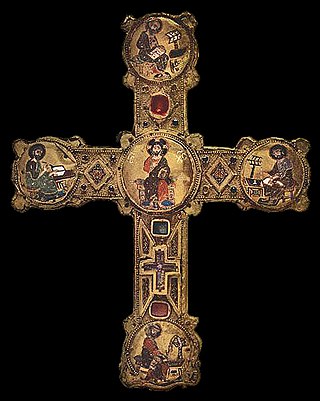Alberto is the Romance version of the Latinized form (Albertus) of Germanic Adalbert . It is used in Italian, Portuguese and Spanish. It derives from the Old German Athala (meaning noble) and Berth (meaning bright). [1] [2] Notable people with the name include:
- Adalberto the Margrave (fl. 10th century), Italian noble-man
- Adalberto Tejeda Olivares (1888–1960), Mexican politician
- Prince Adalberto, Duke of Bergamo (1898–1982), Italian general and nobleman
- Adalberto Libera (1903–1963), Italian architect
- Adalberto Cardoso (1905–1972), Brazilian long-distance runner
- Adalberto Pereira dos Santos (1905–1984), Brazilian general and politician
- Adalberto Ortiz (1914–2003), Ecuadorian politician
- Adalberto Martínez Chávez, aka Resortes (1916–2003), Mexican actor
- Adalberto Almeida y Merino (1916–2008), Mexican Catholic prelate
- Adalberto López (1923–1996), Mexican football striker
- Adalberto Lepri (1929–2014), Italian wrestler
- Adalberto Rodríguez (1934–2015), Puerto Rican actor and comedian
- Adalberto Arturo Rosat (1934–2015), Bolivian bishop
- Adalberto Santiago (born 1937), Puerto Rican salsa singer
- Adalberto Hernández (born 1938), Mexican boxer
- Adalberto Maria Merli (born 1938), Italian actor
- Adalberto Scorza (born 1938), Argentine race walker
- Adalberto Giazotto (1940–2017), Italian physicist
- Adalberto Rodríguez Giavarini (born 1944), Argentine economist and diplomat
- Adalberto Siebens (born 1946), Puerto Rican boxer
- Adalberto Álvarez (born 1948), Cuban pianist and composer
- Adalberto Álvarez y su Son, Cuban band by the pianist
- Adalberto Álvarez Marines (born 1952), Mexican artist
- Adalberto Campos Fernandes (born 1958), Portuguese politician
- Adalberto Jordan (born 1961), Cuban-American judge
- Adal Ramones (born 1961), Mexican television show host
- Adalberto Costa Júnior (born 1962), Angolan politician
- Adalberto Machado (born 1964), Brazilian football left-back
- Adalberto Bravo (born 1965), Venezuelan-American musician
- Adalberto García (born 1967), Brazilian long-distance runner
- Adalberto Figarolo di Gropello (fl. 1967–1971), Italian diplomat
- Adalberto Madero (born 1969), Mexican lawyer and politician
- Adalberto Ribeiro (born 1969), Portuguese football centre-back
- Adalberto Mendez (athlete) (born 1974), Dominican sprinter
- Adalberto Silva (born 1979), Brazilian volleyball player
- Adalberto Palma (born 1981), Mexican football defender
- Adalberto Méndez (born 1982), Dominican baseball player
- Adalberto Román (born 1987), Paraguayan football centre-back
- Adalberto (footballer, born 1964), Brazilian football left back
- Adalberto (footballer, born 1987), Brazilian football centre-back
- Adalberto Mejía (born 1993), Dominican baseball pitcher
- Adalberto Mondesí (born 1996), American baseball player
- Adalberto Peñaranda (born 1997), Venezuelan football forward
- Adalberto Carrasquilla (born 1998), Panamanian football midfielder
- Adalberto Ottone Rielander (died 2002), Papua New Guinean clergyman and bishop


